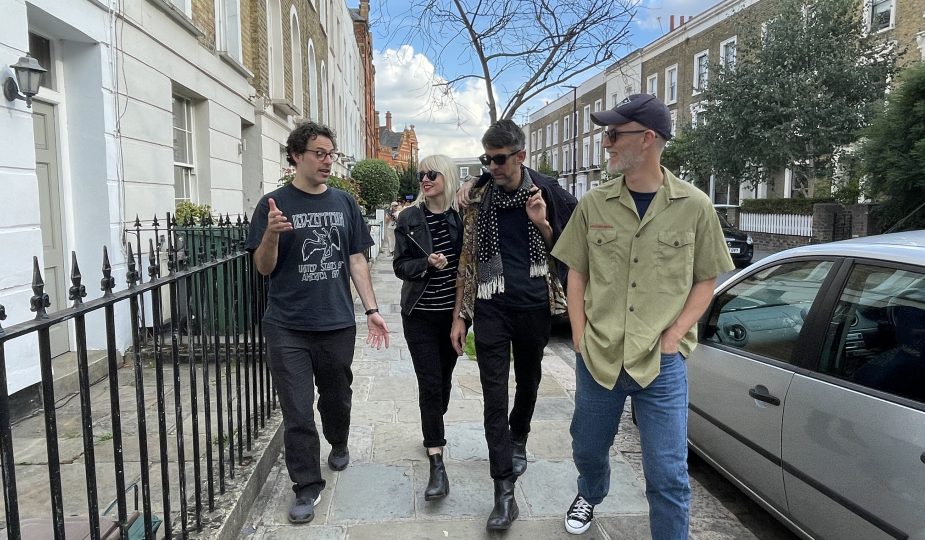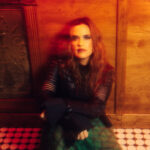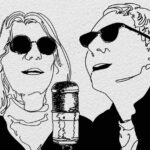
When The Open Flames came together, an informal exchange of ideas quickly transformed into a band now set to release their forthcoming album, Same Time Next Year. With members spread across multiple countries, their music stands as a testament to the power of connection across distances. Drummer Evan Sult, formerly of Harvey Danger, the group behind “Flagpole Sitta,” famously the theme for Peep Show, shares the story of The Open Flames.
Can you recall the precise moment The Open Flames went from an idea to a living, breathing group?
Before it was a group it was a fun way to get through the pandemic — I had been woodshedding on drums for a few weeks when Dave sent me a demo of “Lockdown,” and from there we just kept the musical conversation going. But I’d say it wasn’t until after we’d already been tracking in the same London studio a couple of times that the moment hit. Because we’d been doing this internationally, we were initially trying to cram as much music into a couple of days as we could. But when we slowed down, and just started doing everything at the pace and level of detail that the songs deserved: that’s when I personally felt like, Aha, this is more than just fun, this is real music.
Duncan Thornley, the engineer at MAP Recording Studio, really showed his chops in those moments, and it was thrilling to be able to really dig in and explore each sound of each instrument, and all the fun bits of mixing that take a song from a bunch of lyrics and chords into a piece of art. The first time that happened was on “Falling Up,” especially as we dug through the outro instrumental, but the most vivid moment was when we finally finished constructing the final passage of “Drop a Coin,” where all of this noise we’d been making got wrestled down into an actual narrative audio experience that matched the spooky spirit of the lyrics. (Which, I should add, is best observed in headphones.)
Before The Open Flames, each of you had distinct musical journeys. Could you share some of the key moments and experiences from your individual careers?
For me, it’s impossible not to mention my very first band in Seattle, Harvey Danger, and the lightning-strike experience of having one of our songs blow up on the radio, and going from local band to major-label radio-festival act in a matter of months. That was of course amazing, and as much as I tried to experience it all, it’s true what they all told us at the time: you’ve got it so good you don’t even know how good you’ve got it. After that band ended (temporarily, as it turned out), I moved to Chicago and put all of my energy into Bound Stems, a band I was very proud of that put out a couple of albums and toured all over the country.
But my favorite actual lived experience, even among everything else, has to be playing in Sleepy Kitty with my partner Paige Brubeck, who also sings and plays guitar and sometimes bass in The Open Flames. Being in a true two-piece is such a giant challenge, but it’s also been a whole other dream come true, because everything one does with the band accrues to the relationship as well: both of us get to feel the joy of finishing a song, we both get to play in the studio, we both visit each city together and eat all of these great veg meals all over the country together… The power in that sense of sharing with the person one loves, instead of leading separate lives far away from each other, cannot be overstated.
Your name suggests warmth and intensity, how did you settle on The Open Flames?
We were in the studio in London and I think it just tumbled out of my mouth… maybe while I was talking about something else? I think I was talking about one of the songs, like, “It should sound like she’s flying over the open flames of hell” or something, and a few minutes later I mentioned that it would make a good band name. I do agree that it’s got intensity, and associations both positive and negative, which is interesting enough to build a band on…
What inspired the lyrics and sound of “Drop a Coin”?
The lyrics were Dave’s doing, and I think came from the unsettling initial image of a blind girl at the gates of hell — which ends up serving as a metaphor for a person facing any crisis, from first date to approaching death. When we started on the music, it felt like it needed a steady pulse, and I originally pictured it eventually fading down at the end. But after I played the drum track, Dave and Duncan argued for keeping the whole length because it felt natural, so we started playing with the song’s content. It had ended with this great image, “step into the light / … you don’t hear a sound / except the singing of a choir…” and we used Paige’s multitracked voice as a gateway to a whole new passage, where a heavy, low, uncomfortable male voice thrums below a higher, more angelic voice, and the music starts to break apart. It’s meant to feel like the soul of the protagonist has actually passed through into hell and is experiencing it firsthand. The final sounds, to me, are like some sort of dark beast dragging its heavy scales into the light, and then it sort of swirls up and out of sight. I’m really happy with how that song came out.
Do you write lyrics collectively or individually? What’s the usual starting point for your songs, a phrase, a riff, or a mood?
Dave writes the songs and then eventually presents them to us. But he’s not here right now, so I’ll talk instead about what happens next: if the songs get us excited, we write back and tell him so, and then I start working on drums and thinking about elements of arrangement. He writes with guitar and vocal, which leaves us free to think about how to get into it. Tremolo? Speed the tempo up? Distortion, or acoustic? What role might Paige’s vocals play? A lot of times, Paige’s voice adds a whole other character to the narrative, which brings more complexity to the story.
Your performances have been described as electrifying. How do you prepare for a gig to ensure that energy translates to your audience?
Dave and I have known each other since high school, and he’s always been prone to crazy and ill-advised adventures. At the same time, he’s managed to survive them all so far, so credit where credit’s due. I never worry if Dave’s going to bring enough energy to the room — he’ll show up in green hair with an orange beard or whatever, literally bouncing off the walls, and all I have to do is help keep the tempo to a manageable level. Paige and I have logged plenty of stage time together, so we know how to have fun, and for me, coming from a band without a bassist, being able to play back and forth with Len is great. We’ve all been around, but we’re still rocking that new relationship energy, you know.
Which artists have shaped your sound, and who would you love to collaborate with?
For me there’s always Pavement and Guided By Voices and Velvet Underground and The Fall and early PJ Harvey and I don’t know, dozens of others — lately Buffalo Springfield and Jacques Dutronc are both bumping around in my head. I keep finding that The Open Flames draws on the energy of R.E.M. and the Replacements, especially the way they can shift between ecstatic chaos and reflective regret. I think Dave is really good at putting himself in the head of other people he has encountered, people who are facing some sort of crisis or breakthrough. That makes me think of bands like Sebadoh or Rolling Blackouts Coastal Fever or Death Cab For Cutie.
For collaboration, I think it would be awfully cool to work with someone like Courtney Barnett, who is great at winding around another singer, or Cate Le Bon, who has a really fascinating guitar style of her own and amazing production instincts. But because we’re a far-flung band, with lives in New York, London, DC, Paris, every song feels like a collaboration, and like we’re just getting started combining our powers — and I include Duncan in that mix. But I will say, if Scott Litt or Tony Visconti were down to produce a song or ten, I think we could make some amazing music together.
What’s been the biggest challenge of being a band in today’s music industry?
After many different versions of being in a band, I’ve found a liberating trick: don’t ask music to pay the bills. Once that’s out of the way, the actual writing, recording, releasing and performing of music is way, way more fun.
What can you tell us about Same Time Next Year and live shows?
This is an album made by friends for each other, and then gradually for everyone else. It’s a process record: we started as one thing and finished up as another, and the album charts that course (nonlinearly, I should add, because it sounds better this way). I’m proud of where we got, and I’m looking forward to more. If you see that we’re playing in your city, make sure to come see: we don’t play all too often, so we’re going to be giving it our all when we do.




